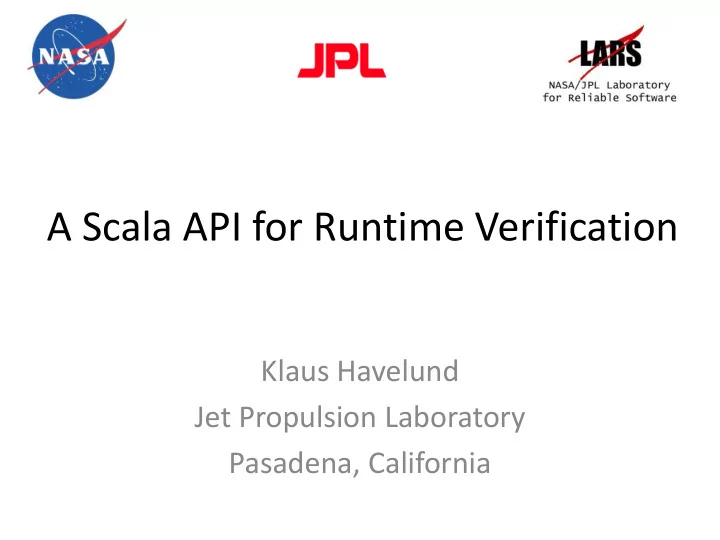

A Scala API for Runtime Verification Klaus Havelund Jet Propulsion Laboratory Pasadena, California
A Scala API for Runtime Verification DSL Klaus Havelund Jet Propulsion Laboratory Pasadena, California
understanding complex systems by analyzing their execution A Scala API for Runtime Verification DSL Klaus Havelund Jet Propulsion Laboratory Pasadena, California
log analysis event monitor event event
fault protection response monitor event
a DSL for log analysis
a LogScope property CommandMustSucceed: “An issued command must succeed, without a failure to o ccur before then”. monitor CommandMustSucceed { always { COMMAND(n,x) => RequireSuccess(n,x) } hot RequireSuccess(name,number) { FAIL(name,number) => error SUCCESS(name,number) => ok } }
user reaction excellent but (2 days later) • I read the manual and was • can I define a function and up an running, all before call it in a formula? lunch • is it possible to re-use • my first spec had no errors formulas? and just worked
external versus internal DSL DSL parser DSL combines parameterized programming programming state machines language language and temporal logic. internal DSL external DSL
pros and cons for internal DSL pros cons • decreases development • steep learning curve effort • limited analyzability • increases expressiveness • allows use of existing IDE, debuggers, etc.
Scala as a unifier script-like functional object oriented high performance with strong typing
events abstract class Event case class COMMAND(name: String, nr: Int) extends Event case class SUCCESS(name: String, nr: Int) extends Event case class FAIL(name: String, nr: Int) extends Event val trace : List[Event] = List( COMMAND("STOP_DRIVING", 1), COMMAND("TAKE_PICTURE", 2), event SUCCESS("TAKE_PICTURE", 2), event SUCCESS("TAKE_PICTURE", 2) event )
monitor CommandMustSucceed { always { COMMAND(n,x) => RequireSuccess(n,x) } hot RequireSuccess(name,number) { FAIL(name,number) => error SUCCESS(name,number) => ok } } class CommandMustSucceed extends Monitor[Event] { always { case COMMAND(n,x) => RequireSuccess(n,x) } def RequireSuccess(name: String, number: Int) = hot { case FAIL(`name`, `number`) => error case SUCCESS(`name`, `number`) => ok } }
monitor CommandMustSucceed { always { COMMAND(n,x) => RequireSuccess(n,x) } hot RequireSuccess(name,number) { FAIL(name,number) => error SUCCESS(name,number) => ok } } inlining a state class CommandMustSucceed extends Monitor[Event] { always { case COMMAND(n, x) => hot { case FAIL(`n`, `x`) => error case SUCCESS(`n`, `x`) => ok } } }
monitor CommandMustSucceed { always { COMMAND(n,x) => RequireSuccess(n,x) } hot RequireSuccess(name,number) { FAIL(name,number) => error SUCCESS(name,number) => ok } } linear temporal logic class CommandMustSucceed extends Monitor[Event] { always { case COMMAND(n, x) => not(FAIL(n, x)) until (SUCCESS(n, x)) } }
monitor CommandMustSucceed { always { COMMAND(n,x) => RequireSuccess(n,x) } hot RequireSuccess(name,number) { FAIL(name,number) => error SUCCESS(name,number) => ok } } first 10 commands must succeed class CommandMustSucceed extends Monitor[Event] { var count = 0 always { case COMMAND(n, x) if count < 10 => count += 1 not(FAIL(n, x)) until (SUCCESS(n, x)) } }
class Monitor[Event] { … type Block = PartialFunction[Event, Formula] (*\label{type-block}*) // states: def always(block: Block): Formula def state(block: Block): Formula def hot(block: Block): Formula def step(block: Block): Formula def strong(block: Block): Formula def weak(block: Block): Formula // future time temporal logic: def not(formula: Formula): Formula def globally(formula: Formula): Formula def eventually(formula: Formula): Formula def strongnext(formula: Formula): Formula def matches(predicate: PartialFunction[Event, Boolean]): Formula def within(time: Int)(formula: Formula): Formula }
the state function CommandMustSucceed: “An issued command can succeed at most once”. class MaxOneSuccess extends Monitor[Event] { always { case SUCCESS(_, number) => state { case SUCCESS(_, `number`) => error } } }
analyzing a trace class Requirements extends Monitor[Event] { compose monitor( new CommandMustSucceed, new MaxOneSuccess ) } run object Apply { def readLog (): List*Event+ = ,…- def main(args: Array[String]) { val monitor = new Requirements val log = readLog() monitor.verify(log) } }
result Monitor: CommandMustSucceed Error trace: 1=COMMAND(STOP_DRIVING,1) -------------------------------- Monitor: MaxOneSuccess Error trace: 2=COMMAND(TAKE_PICTURE,2) 3=SUCCESS(TAKE_PICTURE,2) 4=SUCCESS(TAKE_PICTURE,2)
command verification in LADEE mission verified command sequence class R42 extends Monitor[Event] { always { command case COMMAND("ACS_MODE", _, time1, _) => sequence state { case COMMAND("ACS", _, time2, _) => (time1,time2) beyond (1 second) } } }
implementation – formulas abstract class Formula { def apply(event: Event): Formula def reduce(): Formula = this def and(that: Formula): Formula = And(this, that).reduce() def until(that: Formula): Formula = Until(this, that).reduce() ... }
states case class State(block: Block) extends Formula { // Hot the same override def apply(event: Event): Formula = if (block.isDefinedAt(event)) block(event) else this } case class Step(block: Block) extends Formula { override def apply(event: Event): Formula = if (block.isDefinedAt(event)) block(event) else True } case class Strong(block: Block) extends Formula { // Weak the same override def apply(event: Event): Formula = if (block.isDefinedAt(event)) block(event) else False }
globally and eventually case class Globally(formula: Formula) extends Formula { override def apply(event: Event): Formula = And(formula(event), this ).reduce() } case class Eventually(formula: Formula) extends Formula { override def apply(event: Event): Formula = Or(formula(event), this ).reduce() }
and case class And(formula1: Formula, formula2: Formula) extends Formula { override def apply(event: Event): Formula = And(formula1(event), formula2(event)).reduce() override def reduce(): Formula = { (formula1, formula2) match { case (False, _) => False case (_, False) => False case (True, _) => formula2 case (_, True) => formula1 case (f1, f2) if f1 == f2 => f1 case _ => this } } }
at the end def end(formula: Formula): Boolean = formula match { case State(_) => true case Hot(_) => false case Strong(_) => false case Weak(_) => true case Step(_) => true … case Globally(_) => true case Eventually(_) => false … case And(formula1, formula2) => end(formula1) && end(formula2) }
future plans • optimization – internal DSL is not analyzable – indexing: map incoming events to monitors • application within LADEE mission – feature refinement (expressiveness) • trace analysis in a broader perspective: – trace monitoring for embedded systems – trace mining – trace visualization understanding complex systems by analyzing their execution
Recommend
More recommend